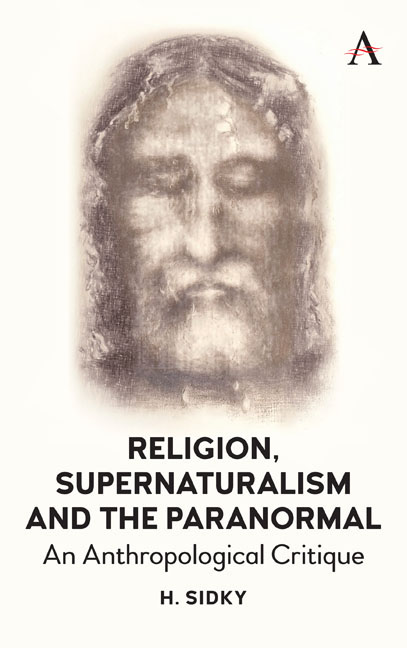Book contents
- Frontmatter
- Dedication
- Contents
- Acknowledgments
- Introduction
- Chapter One The Problem with Religion: Preliminary Issues
- Chapter Two The Unreal Real: The Supernatural, Religion, and the Paranormal
- Chapter Three Can Science Say Anything About Religion and the Supernatural?
- Chapter Four Ghostly Rappings, the Science of the Soul, and the Religious Nature of the Paranormal
- Chapter Five Ghostly Encounters in the Field: Anthropology of the Paranormal or Paranormal Anthropology?
- Chapter Six Why We Think the World Is Haunted
- Chapter Seven Cognitive Biases and Why People Think Eerie Thoughts
- Chapter Eight Miracles as Evidence of God's Actions in the World
- Chapter Nine When God Talks to People: Are Religious Experience Evidence of God?
- Chapter Ten Books Authored by God? Sacred Texts as Evidence of the Supernatural
- Chapter Eleven God's Fingerprints in the Natural World: Intelligent Design, Irreducible Complexity, and Cosmic Fine-Tuning
- Chapter Twelve The Miracles of the Bible: The Quintessential Foundations of Paranormal Beliefs in Western Culture
- Chapter Thirteen Jesus the Miracle Worker, Magician, and Sorcerer
- Chapter Fourteen Jesus's Empty Tomb, Missing Body, and Return from The Dead: Sources for the Paranormal Tale
- Chapter Fifteen The Post-Resurrection Appearances in the New Testament
- Chapter Sixteen Coping with Failed Prophesy: A Socio-Psychological Explanation for the Rise of Christianity
- Chapter Seventeen Conclusions: Why Religious and Paranormal Beliefs Persist and Their Dangers
- References
- Index
Chapter Five - Ghostly Encounters in the Field: Anthropology of the Paranormal or Paranormal Anthropology?
Published online by Cambridge University Press: 16 December 2019
- Frontmatter
- Dedication
- Contents
- Acknowledgments
- Introduction
- Chapter One The Problem with Religion: Preliminary Issues
- Chapter Two The Unreal Real: The Supernatural, Religion, and the Paranormal
- Chapter Three Can Science Say Anything About Religion and the Supernatural?
- Chapter Four Ghostly Rappings, the Science of the Soul, and the Religious Nature of the Paranormal
- Chapter Five Ghostly Encounters in the Field: Anthropology of the Paranormal or Paranormal Anthropology?
- Chapter Six Why We Think the World Is Haunted
- Chapter Seven Cognitive Biases and Why People Think Eerie Thoughts
- Chapter Eight Miracles as Evidence of God's Actions in the World
- Chapter Nine When God Talks to People: Are Religious Experience Evidence of God?
- Chapter Ten Books Authored by God? Sacred Texts as Evidence of the Supernatural
- Chapter Eleven God's Fingerprints in the Natural World: Intelligent Design, Irreducible Complexity, and Cosmic Fine-Tuning
- Chapter Twelve The Miracles of the Bible: The Quintessential Foundations of Paranormal Beliefs in Western Culture
- Chapter Thirteen Jesus the Miracle Worker, Magician, and Sorcerer
- Chapter Fourteen Jesus's Empty Tomb, Missing Body, and Return from The Dead: Sources for the Paranormal Tale
- Chapter Fifteen The Post-Resurrection Appearances in the New Testament
- Chapter Sixteen Coping with Failed Prophesy: A Socio-Psychological Explanation for the Rise of Christianity
- Chapter Seventeen Conclusions: Why Religious and Paranormal Beliefs Persist and Their Dangers
- References
- Index
Summary
Anthropology has taught us that the world is differently defined in different places. […] the worlds of different people have different shapes. […] space does not conform to Euclidean geometry, time does not form a continuous unidirectional flow, causation does not conform to Aristotelian logic, man is not differentiated from nonman or life from death, as in our world.
— Walter Goldschmidt, foreword to Castaneda's The Teachings of Don Juan (1968)When [anecdotes] are the only source of data they cannot be used to reach extraordinary (or even ordinary) conclusions. The plural of anecdote is not “data.”
— Victor Stenger, God and the Folly of Faith (2012)In contrast to anthropologists who subscribe to the hands-off approach to religious truths and paranormal beliefs, there are those who embrace the spiritual and paranormal suppositions of the people they study. This kind of anthropology developed around the personal anomalistic or weird experiences of several researchers while they were engaged in field research in cultures away from home. These types of events are nothing new or unique. What is new is how some researchers have interpreted such occurrences.
During my fieldwork in Nepal, the paranormal was always around. Nepalese shamans with whom I worked are practitioners who claim to have access to recondite, otherworldly knowledge and to possess the capacity to interact with and embody spirits, foretell the future, and divine the sources and causes of misfortune and illness. Paranormalists, psychics, clairvoyants, evangelical faith-healers, and other such practitioners in the West more or less say the same thing. Nepalese shamans can also purportedly communicate with ghosts, raise the souls of the dead in cremation grounds during late-night ceremonies, exorcise evil spirits, and summon demons at crossroads to harm enemies. There is also a remarkable parallel between the “alien abduction” narratives commonly reported in the United States and the supernatural kidnapping stories associated with the shamanic calling in Nepal (see Sidky 2008: 147– 62).
In the Tibetan community in Northern India, I encountered individuals who claim to be the reincarnations of known deceased personages and say they can recall their past lives. Some Tibetan monks avow that they can levitate during meditative states and invited me to observe their remarkable abilities.
- Type
- Chapter
- Information
- Religion, Supernaturalism, the Paranormal and PseudoscienceAn Anthropological Critique, pp. 111 - 120Publisher: Anthem PressPrint publication year: 2019



